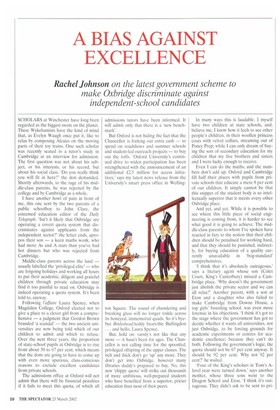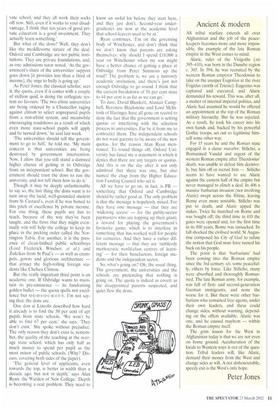A BIAS AGAINST EXCELLENCE
Rachel Johnson on the latest government scheme to
make Oxbridge discriminate against independent-school candidates
SCHOLARS at Winchester have long been regarded as the biggest swots on the planet. These Wykehamists have the kind of mind that, as Evelyn Waugh once put it, like to relax by composing Alcaics on the moving parts of their toy trains. One such scholar was recently seated in a tutor's study in Cambridge at an interview for admission. The first question was not about his subject, or his interests, or his record, but about his social class. 'Do you really think you will fit in here?' the don demanded. Shortly afterwards, to the rage of his middle-class parents, he was rejected by the college and by Cambridge as a whole.
I have another howl of pain in front of me, this one sent by the two parents of a public schoolboy to John Clare, the esteemed education editor of the Daily Telegraph. 'Isn't it likely that Oxbridge are operating a covert quota system that discriminates against applicants from the independent sector?' the letter ends, apropos their son — a keen maths wonk, who had more As and A stars than you've had hot dinners but who was rejected from Cambridge.
Middle-class parents across the land — usually labelled the 'privileged elite' — who are forgoing holidays and working all hours to put their academic, diligent and grateful children through private education may find it too painful to read on. Oxbridge is indeed operating a quota system. It's been told to, anyway.
Following l'affaire Laura Spence. when Magdalen College, Oxford elected not to give a place to a clever girl from a comprehensive — a judgment that Gordon Brown branded 'a scandal' — the two ancient universities are now being told which of our children to admit and which to refuse. Over the next three years, the proportion of state-school pupils at Oxbridge is to rise from about 50 to 67 per cent, which means that the dons are going to have to come up with even more spurious, class-conscious reasons to exclude excellent candidates from private schools.
The admissions office at Oxford will not admit that there will be financial penalties if it fails to meet this quota, of which all admissions tutors have been informed. It will admit only that there is a 'new benchmark'.
But Oxford is not hiding the fact that the Chancellor is forking out extra cash to spend on roadshows and summer schools and student-led outreach projects — to buy out the toffs. 'Oxford University's continued drive to widen participation has been strengthened with the announcement of an additional £2.5 million for access initiatives,' says my latest news release from the University's smart press office in Welling ton Square. The sound of chundering and breaking glass will no longer tinkle across its honeyed, immemorial quads. So it's byebye Bridesheaditeddy bears/the Bullingclon . . . and hello, Laura Spence.
But, hold on: varsity's not like that any more — it hasn't been for ages. The Chancellor is not calling time for the spoonfed, privileged offspring of the upper classes. The rich and thick don't go 'upany more. They don't get into Oxbridge, however many libraries daddy's prepared to buy. No, this new `chippy quota' will strike out thousands of more ambitious, well-prepared students who have benefited from a superior, pricier education than most of their peers.
In many ways this is laudable. I myself have two children at state schools, and, believe me, I know how it feels to see other people's children, in their woollen princess coats with velvet collars, streaming out of Poncy Prep; while I can only dream of buying the sort of secondary education for my children that my five brothers and sisters and I were lucky enough to receive.
Even I can do the maths, and the numbers don't add up. Oxford and Cambridge fill half their places with pupils from private schools that educate a mere 8 per cent of our children. It simply cannot be that this snippet of the student body is so intellectually superior that it merits every other Oxbridge place.
And yet, and yet. While it is possible to see where this little piece of social engineering is coming from, it is harder to see what good it is going to achieve. The middle-class parents to whom I've spoken have reacted in fury to the notion that their children should be penalised for working hard, and that they should be punished, indirectly, for buying education of a quality currently unavailable in 'bog-standard' comprehensives.
'I think that it's absolutely outrageous,' says a literary agent whose son (Colet Court, King's Canterbury) missed a Cambridge place. 'Why doesn't the government just abolish the private sector and we can all relax?' Another parent, with a son at Eton and a daughter who also failed to make Cambridge from Downe House, a top girls' boarding school, was even more forensic in his objections. 'I think it's got to the stage where the government has got to decide whether it wants all universities, not just Oxbridge, to be forcing grounds for academic experiments or centres for academic excellence; because they can't do both. Following the government's logic, the quota should not be 67 per cent anyway. It should be 92 per cent. Why not 92 per cent?' he wailed.
'Four of the King's scholars in Tom's Alevel year were turned down,' says another mother, whose three sons went to the Dragon School and Eton. 'I think it's outrageous. They didn't ask to be sent to pri vate school, and they all work their socks off now. Still, even if it works to your disadvantage. I think that ten years of good private education is a good investment. They actually learn something.'
But what of the dons? Well, they don't like the meddlesome nature of the deal. Oxford and Cambridge are not public institutions. They are private foundations, and, as one admissions tutor noted, 'As the government's share of the universities' support goes down [it provides less than a third of income], the urge to bully is going up.'
As Peter Jones, the classical scholar, sees it, the quota, even if it comes with a couple of million quid, is doing the collegiate system no favours. The two elitist universities are being ordered by a Chancellor raging against elitism to select unprepared pupils from a non-elitist system, and meanwhile encouraging roadshows as a result of which even more state-school pupils will apply and be turned down,' he said last week.
'The universities should tell the government to go to hell.' he told me. 'My main concern is that universities are being destroyed by government intervention. Now, I allow that you still stand a damned higher chance of getting in to Oxbridge from an independent school, But the government should trust the dons to run the university, and not tell them how to do it.'
Though it may be deeply unfashionable to say so, the last thing the dons want is to turn away the lucid, well-grounded student from St Custard's, even if he was honed to this pitch of excellence by private income. For one thing, these pupils are fun to teach, because of the way they've been taught, and the firsts that they might eventually win will help the college to keep its place in the pecking order called the Norrington Table. For another, it is the presence of clean-limbed public schoolboys (Lord Frederick Windsor, et al.) and Zuleikas from St Paul's — as well as crumpets, gowns and glorious architecture — that attract the high-rolling foreign students like Chelsea Clinton.
But the really important third point is an academic one. If Oxbridge wants to maintain its pre-eminence — its fundraising golden bullet — the quota spells not excellence but M-E-D-I-D-C-R-I-T-Y. I'm not saying that: the dons are.
One don at Lincoln described how hard it already is to find the 50 per cent of apt pupils from state schools. 'We won't be able to find 67 per cent,' she says. 'They don't exist.' She spoke without prejudice. The only reason they don't exist is, remember, the quality of the teaching at the average state school, which has only half as much money to spend per pupil as the most minor of public schools. (Why? Discuss, covering both sides of the paper).
'The general level of applicants, even towards the top, is better in width than a decade ago, but not in depth.' says Alan Ryan, the Warden of New College. 'Depth is becoming a real problem. They need to know an awful lot before they start here, and they just don't. Second-year undergraduates are now at the academic level that school-leavers used to be at.'
Ryan continues, 'I'm on the governing body of Winchester, and don't think that we don't know that parents are asking themselves: why should I spend £18,000 a year on Winchester when my son might have a better chance of getting a place at Oxbridge from Peter Simmons up the road? The problem is, we are a narrowly academic institution, and there's just not enough Oxbridge to go round. I think that the current breakdown of 56 per cent state to 44 per cent is as far as we can go.'
To date, David Blunkett, Alastair Campbell, Baroness Blackstone and Lord McIntosh of Haringey have all gone on record to deny the fact that the government is setting quotas or interfering with the selection process in universities. Far be it from me to contradict them. The independent schools do not want parents to be aware of the new quotas. for the reason Alan Ryan mentioned. To round things off, Oxford Universit.s.,, has faxed me a statement in which it denies that there are any targets or quotas. And this is on the day after it not only admitted that there was one, but also named the chap from the Higher Education Funding Council who set it.
All we have to go on, in fact, is PR — something that Oxford and Cambridge should he rather good at. The only problem is that the message is hopelessly mixed. For they have one message — that they are 'widening access' — for the public-sector paymasters who are topping up their grant; a reward for playing the government's favourite game. which is to interfere in something that has worked well for people for centuries. And they have a rather different message — that they are 'ruthlessly meritocratic world-class centres of learning' — for their benefactors, foreign students and the independent sector.
So, what's going on? Oh, the usual thing. The government, the universities and the schools are pretending that nothing is going on. The quota is indeed as covert as the disappointed parents suspected, and quiet flow the dons.



















































































 Previous page
Previous page